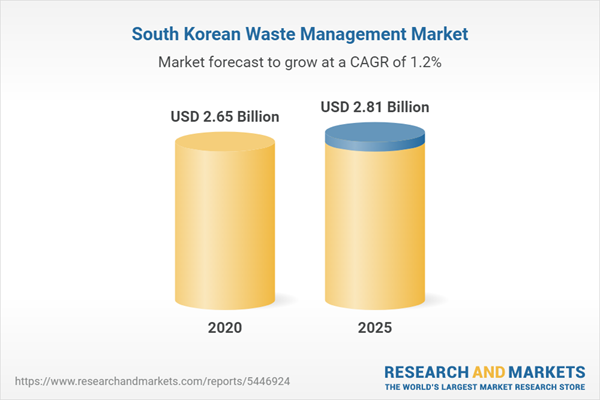Key Highlights
- The waste management industry consists of all municipal solid waste (MSW) - including non-hazardous waste generated in households, commercial establishments and institutions, and non-hazardous industrial process wastes, agricultural waste and sewage sludge.
- The South Korean waste management industry had total revenues of $2.6bn in 2020, representing a compound annual growth rate (CAGR) of 0.4% between 2016 and 2020.
- Industry consumption volumes declined with a compound annual rate of change (CARC) of -0.6% between 2016 and 2020, to reach a total of 18.1 million tons in 2020.
- South Korea has a highly organized waste management system known as jongnyangje.
Scope
- Save time carrying out entry-level research by identifying the size, growth, major segments, and leading players in the waste management market in South Korea
- Use the Five Forces analysis to determine the competitive intensity and therefore attractiveness of the waste management market in South Korea
- Leading company profiles reveal details of key waste management market players’ global operations and financial performance
- Add weight to presentations and pitches by understanding the future growth prospects of the South Korea waste management market with five year forecasts by both value and volume
Reasons to Buy
- What was the size of the South Korea waste management market by value in 2020?
- What will be the size of the South Korea waste management market in 2025?
- What factors are affecting the strength of competition in the South Korea waste management market?
- How has the market performed over the last five years?
- What are the main segments that make up South Korea's waste management market?
Table of Contents
Companies Mentioned (Partial List)
A selection of companies mentioned in this report includes, but is not limited to:
- Sembcorp Industries Ltd
Table Information
| Report Attribute | Details |
|---|---|
| No. of Pages | 32 |
| Published | August 2021 |
| Forecast Period | 2020 - 2025 |
| Estimated Market Value ( USD | $ 2.65 Billion |
| Forecasted Market Value ( USD | $ 2.81 Billion |
| Compound Annual Growth Rate | 1.1% |
| Regions Covered | South Korea |









